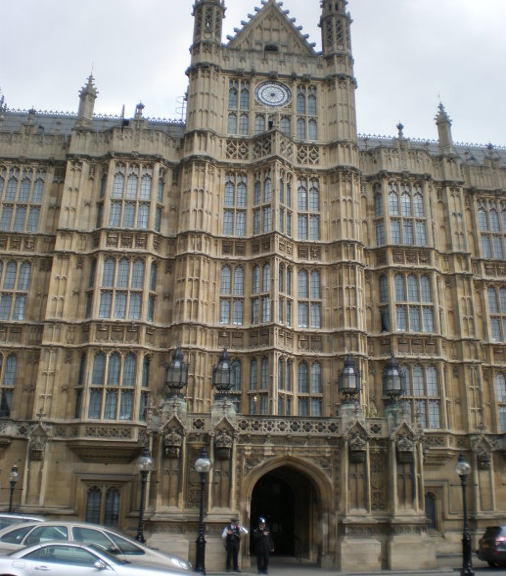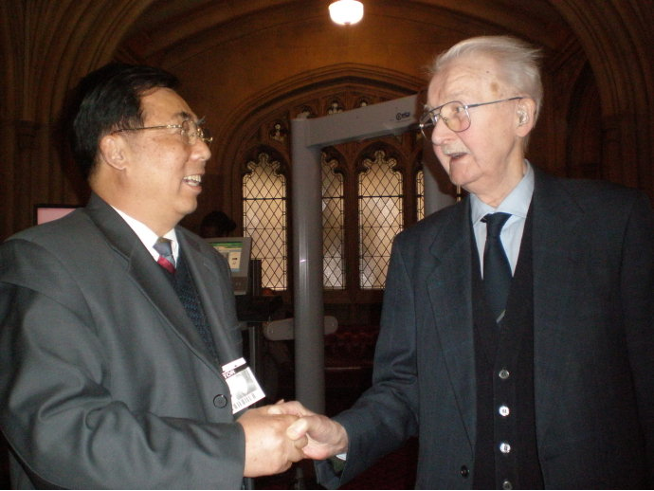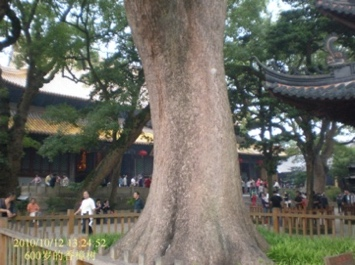In the early morning of April 26, 2011, we took the train from Xuzhou Railway Station to Beijing and in the afternoon we took the metro to Capital Airport, where we waited until two o’clock the next morning when the flight to Doha took off. The distance between Beijing and Doha being 6262 km, we were in the plane for 9 hours. At six in the morning of the local time we began to wait to transfer to London (Doha time is 5 hours later than Beijing time). The transfer was convenient and we waited only for one hour, at 7:50 the plane taking off on time. The plane flied 5246 km, and it took 7 hours and 25 minutes. At 1:15 pm of April 27 we arrived at Heathrow Airport of London (daylight saving time, London was 7 hours later than Beijing time). From April 28 to May 4 we had been travelling in England and Scotland.
According to our appointment with Prof. Quirk we got to Peers’ Entrance of United Kingdom Parliament. We said to an entrance guard that we had an appointment with Randolph Quirk to meet inside at 3, who smiled and let us get in.
We accepted the regular security check and faced the camera and then got two visit permits with our photos on them, which were hung around our necks. We sat on the Sofa and waited.
Because I saw Quirk’s photos online, I at once recognized him when he appeared. According to our Chinese custom we stood up and let him know we were visiting guests. Before I asked Meilan Zhang to photo when I shook hands with him, recording the hard-won moment. Thanks to his cooperation we got the snapshot. Afterwards he told us no photos in the Parliament and we had to put our camera in the bag.

Peers’ Entrance of United Kingdom Parliament
 \
\
We shaking hands in the end
Prof. Quirk introduced his wife Prof. Dr. Gabriele Stein to us. I repeated Title “Professor” and “Doctor” and pronounced correctly because I used to study German. Mrs. Quirk, a German responded quickly and said that I pronounced her title and name just like speaking German. Two old people were both over 90 and had good health, waists straight, without any sign of looking old and clumsy.
There were a lot of rooms in the Parliament and we were led to the public gallery of the debate hall. Mrs. Quirk pointed to the subject of the debate on the screen: “The level of co-ordination between government departments on the use of soft power in the interests of the UK”. I got to know before that the Britain legislative council, upper house, was called house of peers, having a history of 700 years. Parliamentarians of the house of lords, were not elected and main members were descendants of royal family, descendent nobles,new nobles, judges of courts of appeal, and heads of churches, altogether 699 members, without term of office. Prof. Quirk should be a new noble, i.e. not inherited life peer title of nobility.
Members of the peerage carry the titles of Duke, Marquess, Earl, Viscount or Baron. The titles are hereditary and only one person, usually the eldest son, of the family is the legal heir. Only if the noble has no son, the title can be inherited by a direct descendant who reaches the inherit age. After1958, non-inherited “life peer” title can be awarded to some people, who has made particular contributions in their field, and only Baron. In Great Britain, who receives a peerage title is a great honor, and can get allowance in food, clothing, housing and transportation from the government. As a knight, he or she will be respected and given preferential treatment wherever they are.
I counted the number of the people in the public gallery, altogether 26. These peer parliamentarians are absolutely free, and they can come and go at will. Being not present means giving up right. The legal number of present people is three, and the legal number of peope to pass a bill is 30. Often there are about 100 people present. Only when the bill involves the interests of the peer parliamentarians, will more of them come to vote.
When one person ended his speech, Mrs. Quirk gave a hint and we left for a chophouse. The so called afternoon tea began. We sat at a dining-table and we as guests were arranged to hold the position with wide sight. We had some buffet for breakfast in the hotel, ham and sausage, very full so we had no lunch and now at 4 p.m. became so hungry that my stomach cried out for food. I was not modest and began to choose dishes from a menu because I knew the courtesy difference between China and western countries. We could choose what we liked. Two Chinese guests drank tea and two hosts drank coffee. Before long a few light refreshments were eaten up and Mrs. Quirk asked us whether we would need some more. My wife Meilan Zhang was a very polite lady and said no hurriedly. I looked at the menu and tried to find my favorite vegetables. I found cucumber and potato and asked to have some.
During the afternoon tea, we talked a lot. The Quirks asked us how we got to know each other and how many people there were in our family. I told them how difficult I had in reading Quirk’s work at the beginning. Meilan Zhang told them in German that we studied German in Nanjing University and had to stop because of the culture’s revolution. We went to the countryside, began to teach ourselves English, taught English in the middle school and began to read Quirk. Mrs Quirk got to know why I could pronounce her name and title like German. We inquired about co-authors of Comprehensive Grammar of the English Language. Quirk gave us a photo of them and told us that he and Mr. Leech had paid a visit to Fudan and Nanjing University.
We left the chophouse, they continued to lead us to visit several rooms and introduced the history of the Houses of Parliament, which used to be a palace built in 1060, and then continued to be extended. It stayed a palace until Henry VIII’s removal in 1512. The Houses of Parliament is one of the largest buildings in Gothic Style in the world, the representative of the English romantic architectures, which covers an area of 30,000 sqm, stand erect close to the Thames side, with majestic, fantastic and elegant appearance. Inside there are more than 1,000 rooms. Since 13th century it has been where the Parliament has meetings and at the same time it is the Palace of the King. In 1834, someone kindled a stove in it, burned large amount of government documents and led to a fire burning the palace building, laying the Parliament flat. Later it was built again. In 1859 Big Ben was built on the east side of the Parliament. In May of 1941, the hall of the lower house was bombed by German troops and rebuilt after the war.
.. We were led to an ancient rectangular hall, which was Westminster Abbey, built in 1097, 912 years old, the only old preserved building there. Mrs. Quirk said that many bone ashes of famous people were buried under the ground in the hall, who were the closest to the God. It occurred that important members of the government were invited to make speeches here in the hall, e.g. President Obama of the US, Pope of the Roman Church. She told us the surprising news that the nowadays pope, Joseph Ratzinger (Pope BenedictXVI) used to live in the same street as she. As children they were reading in the same school. She had never thought that he could become Pope one day.
We got out of the hall and had a chance to take photos. We were hugging each other when we decided to leave. They waived to us for a very long time until we could not see them.
In the seventies, eighties and nineties of the last century when I was reading Quirk’s work I had never thought that we had an opportunity one day in the future to meet the master of the grammar of the English language. Whether you considered the problem from the angles of the economy or the politics, I felt it impossible for us to go to London. Now the country opened the door, we retired, were free and had enough money to go abroad without an application to our leaders to wait their permit and without jealous poison arrows shooting at us. We entered the circumstances of living as we liked. Visa in hand, air tickets bought, both of us can go where we wish, meeting our old friends, and enjoying beautiful sceneries in our dream.
Mrs. Quirk never thought her childhood buddy had become the Pope. Obama’s Campaign slogan was: “Anything is possible in the United States.” I saw an English slogan posted on the aerobridge in London airport: “The world belongs to those who see its potential.”, which was in fact the promotion message of HSBC (Hong Kong and Shanghai Banking Corporation). In Australia I read a school promotion message: “There is more in you than you think.” All those above said that a person’s potential was very powerful, but it was not easy to discover and unearth it.
Actually old people do not need to stay too conservative and think that their potential is used up and ease up on themselves, waiting for disappearing in the world. American Granny Moses, who was an ordinary lady and bore more than 10 kids. At the age of 76, she had to give up embroidering because of severe joint inflammation. Her friends suggested her learning to draw oil paintings, which would be useful in recovering her arms. She began to draw and became even more rampant and lived until 101 years old, remaining more than1,000 oil paintings, 20 among which were works done after her 100th birthday. Presidents of the US bought and stored her paintings.
We often use the well-known quotation to blame our own descendants: “A man who does not work hard in his youth will be grieved when he grows old.” Instead, we ourselves should set a good example for them and seniors can also make efforts to excite our potential, trying to succeed in doing things, three years, five years, or longer eight and ten years. What Granny Moses did has proved that one’s career is never too late to start.
Randoph Quirk was born in 1920 and died in 2017. In the early years, he got well-educated in London University, Yale University and University of Michigan, obtaining master’s degree of arts, PhD, Doctor of Letters. He used to hold the position of the president of London University. In 1994, he won the title of life peer. The main works of Quirk were A Grammar of Contemporary English (GCE),1972 and A Comprehensive Grammar of English Language (CGEL), 1985 (co-authors were SG:Sidney Greenbaum; GL:Geoffrey Leech; JS:Jan Svartvik). I began to read GCE, 1,120 pages and took six and half years to finish the first reading. I read it three times from the second half year of 1973 to Oct. of 1989, 16 years.
On Nov. 22 of 1989, I received CGEL, 19 chapters, double contents of GCE. Great changes had taken place because I had tasted the sweet in reading Quirk’s. Until the end of 1989, according to an uncompleted statistic, the number of theses, and all kinds of English exercises I had designed and published on the newspaper or magazines was more than 50. What comforted me most was that the provincial examination and appraisal panel (EAP) approved me as one of the first four senior English teachers in Xuzhou. My ability to read English original works had been improved a lot. 16 years ago I was only a child who toddled in reading original English works and now I became a runner and was not afraid at all in the face of such a huge work.
In the nineties of the last century as I was reading CGEL I found some deficiencies in it and wrote directly to Quirk to query some views in certain chapters. Prof. Quirk answered every letter of mine, confirming my opinions. Exchanging views encouraged me to write a few theses, which were published on the journal “Foreign Language” of Shanghai International Studies University.
Prof. Quirk is a master of the whole world, but few Chinese know him. His works are too large for common people to read who study and use English. The translation version by Suzhou University is not good enough for readers to read. Section 15 said: I wrote the admonition about reading by Zhu Xi, who was a famous Confucianist of Song Dynasty, on the flyleaf of the book: “Peel the skin and you can see the meat; pick out the meat and you can see the bone; break up the bone and you can see the marrow.” After reading for decades, I has the feeling that I have already seen its marrow: the main difference between the traditional English grammar and Quirk’s grammar. I have an idea to simplify and concentrate
his works, namely spurring with long accumulation, in order that a lot of Chinese readers can understand Quirk’s grammar and get to know its powerful advantage. To complete that task, I have again to review CGEL quickly. Now there is pdf files and the whole book can enter my computer. If I want to look for something I can use the ctrl+f command and find it at once.
On the fourth of May, 2011,at 3:05 p.m., the plane we were in took off from Heathrow Airport of London and landed on Doha Airport at midnight. We still waited for about one hour and boarded to fly to Beijing. At 2:40 p.m. of May 5, we arrived at Beijing and took the train at 10:00 p.m., getting to Xuzhou in the early morning of May 6. Altogether it took us 10 days.
Expenses:
air tickets 6300 x 2 =¥12600
tour .. . 5500 x2 = ¥11000
entrance tickets, tips and meals £300×10.06 = ¥3018
visa fee ….. …. 835×2=¥1670
train tickets to & from Nanjing. 52×2+46×2=¥196
train tickets to & from Beijing 106×4= ¥424
metro airport bus 27×2 + 16×2 = ¥86
meals in Beijing ¥50
summation ¥29044
Oct. 27, 2018 Fenghuayuan Xuzhou
Proofreading on Jan 4, 2019 in Xuzhou
Uploading on Aug. 10, 2023









